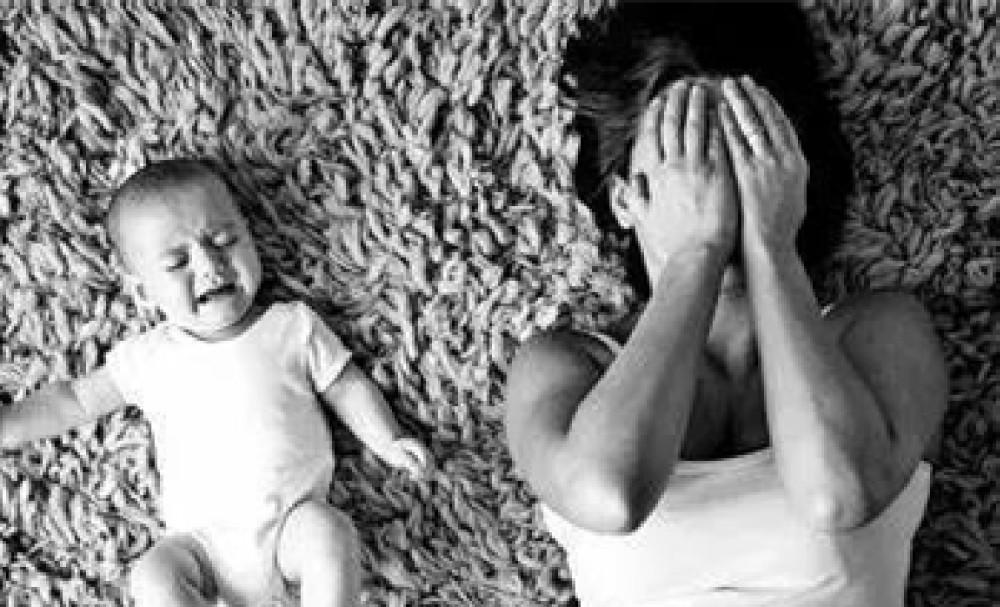Wen | Yuan's mother's parenting diary original, welcome to forward and share personally
Nowadays, the pace of life in society is very fast, the survival pressure of young people is also increasing, and even some data show that the incidence of depression is rising, and among them, especially the postpartum mother group is the most prominent.
Welcoming the arrival of a new life is a joyous thing, but many new mothers will not only not be happy about it, but will be inexplicably depressed, and even shed tears and lose their temper.

According to statistics, about 80% of new mothers will suffer from different degrees of depression after giving birth due to changes in hormone levels, work and rest time and family model changes.
Most mothers will only be affected by this negative emotion for a few days, and then they will return to normal, but many mothers will find it difficult to get out of the haze of depression, which will eventually lead to serious consequences.
Mom's collapse is often only in an instant
On December 20, a mother in Lin'an, Fujian Province, took her twin sons to the hospital for vaccination in the morning, clutching one in her hand and worrying that the other would not run.
And when they came home, they had to rush to prepare lunch, feed, and sleep, but the child did not understand things at all, and stuck to his mother and did not let him do anything, and his mother suddenly had an emotional breakdown, crouched by the wall and cried loudly.
On December 22, a bao mother in Huaibei, Anhui Province, because of the contradiction between her mother-in-law and daughter-in-law, held her son at two o'clock in the morning and cried bitterly: "My son, my baby, why do you call your mother?" ”
Every word is stinging our hearts, when this mother fought against her parents for love, she was beaten, drank medicine, and later got married and had children as she wished, but found that people's lives are far from being as beautiful as she envisioned, people's hearts will change, and her husband will also ignore them because of the trivialities of life.
They were also naïve little girls, but also the treasures in the hands of their parents, but now they are forced by life to this situation, bringing great pressure to the body and mind of the mothers, and this is an important factor in causing postpartum depression, just as the so-called ghost door of childbirth is closed, but can not pass the postpartum depression.
There may be many people who think that postpartum depression is temperament, this view is extremely wrong, and the mother who has experienced postpartum depression is described as follows:
People who have not really experienced the despair will not understand at all! Definitely not a sick moaning, but a burst after a burst, like a ghost upper body, can not get rid of the collapse!
What are the causes of postpartum depression?
First, biological factors
Regardless of the process of pregnancy or childbirth, the hormones in the mother's body will change greatly, and within 24 hours after childbirth, the hormone levels in the body change faster, which can easily induce depression, such as chorionic gonadotropin, norepinephrine a sharp decline.
In addition, genetic factors should also be considered, if Bao Ma's family has a history of depression, then the probability of suffering from depression is much higher than others.
Second, psychological factors
A hundred people have a hundred personalities, and people have a variety of personalities. From a psychological point of view, in general, introverted, sensitive, stubborn, self-centered people tend to suffer from depression more likely than cheerful, optimistic, positive people.
And psychological factors such as anxiety and fear during childbirth will lead to increased physical and psychological stress responses of mothers, more emotional vulnerability, and thus increase the risk of depression.
Third, family factors
Nowadays, there are still "patriarchal" families in many areas, and such ideological concepts will bring great pressure to bao moms and are also one of the risk factors for postpartum depression.
The psychology of postpartum mothers is inherently fragile, so family conflicts and family incomprehension are tantamount to worsening and promoting postpartum depression.
How do mothers with postpartum depression heal themselves?
Pay more attention to yourself and love yourself more
Mothers belong to the dedication personality, and after having children, they will put all their thoughts on them, but don't ignore yourself, because you are good, the baby can be good.
So no matter when, no matter how your identity changes, always remember to love yourself more.
If conditions permit, ask a babysitter, or let the husband and family share it together, and give the mothers appropriate respite time; Don't skimp on giving yourself the appropriate material reward.
Don't care what other people think
After having children, all kinds of gossip will surround us, "your husband works very hard, don't call him up at night", "You can't eat these things during the breast milk period, it's not good for the baby", "You look at people's two children, it's not like you"...
If we take all these words as ordered, we will become an emotional garbage can, and because of those who do not matter, a terrible emotional disaster will occur, so we should listen to positive advice and do not have to care about other people's opinions.
Seek medical attention in a timely manner
If your mother finds that her emotions have seriously affected her life, such as insomnia, inability to control her crying, and the appearance of hurtful thoughts, she must ask a doctor for help.
Although we have become mothers, we are still ourselves, and we love ourselves well in order to love our children better!